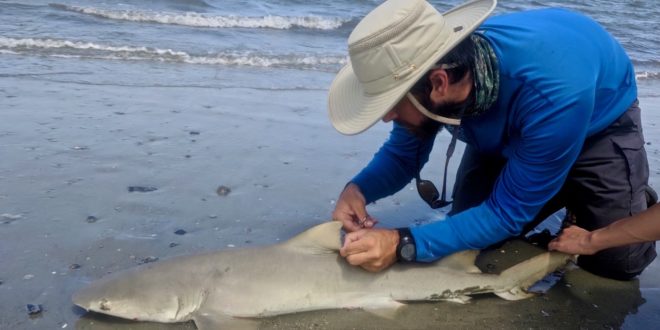By Carley Stickney
Commencement isn’t the only event on the minds of Jacksonville University students this spring. Parasites, sharks, bacteria, DNA, pathogens, migratory patterns–these topics are in the forefront of some of JU’s brightest minds. Meet Jarvis, Katrin, and Andrew, all student grant awardees from the Student Research, Creative Activity & Scholarship (RCAS) program, presenting their work in early April at the University’s annual Student Research Symposium.
Determining Specific Parasite Presence in Maryland’s White-Tailed Deer
Jarvis Strickland (undergraduate, biology)
White-tailed deer are commonly found within the United States and are frequently known to carry infections from mosquitoes and ticks. Using genetic testing, blood samples from white-tailed deer in Maryland during hunt season were analyzed. This process allowed for parasites and bacteria to be found in the blood. The goal of the study going forward is to screen more samples from Maryland’s deer population and determine the prevalence (and types) of infections within white-tailed deer populations and allow for improvements in the field of disease surveillance.
“I have always had a fascination with pathogens and wanted to study them in-depth, and the simple fact that I get to be in a lab working on something I love is amazing,” Strickland said. “This program helps students become better scientists because it places great emphasis on the importance of research and presentation.”
After graduating from JU, Strickland plans to pursue his master’s degree in public health with a concentration in epidemiology from the University of North Florida. “This project is providing me with skills that will be useful in my future research endeavors,” he said. “Even if I do not continue my current project, I will always have the knowledge I gained to guide me through any projects I take on in the future.”
Resident and Migratory Sharks Using Jacksonville’s Coastal Waters
Katrin Villinger (graduate, marine science)
If you’ve ever wondered how many sharks live in Northeast Florida, you’re not the only one. Katrin Villinger’s research focuses on gathering data on shark movement throughout Northeast Florida, as well as habitat usage for residential sharks. Receivers will be deployed on buoys marking the Mayport inlet of the St. Johns River and other nearby sites. The team will then tag sandbar sharks and check the receivers once a month to gather data.
“This project is providing me with field-based knowledge that will be useful as I move forward,” Villinger said. “I am able to hone field techniques that I will be utilizing in future research, occupations, and when furthering my education.”
After graduating with an MS in marine science from JU, she plans to continue researching sharks and their relatives and eventually obtaining her Ph.D. “The RCAS program is important because it provides crucial funding to students that enhance the quality of research being conducted at JU,” she said. “The funding was imperative to the success of my thesis research.”
An Examination of Shark Species Utilizing the Coastal Waters Surrounding a Georgia Barrier Island
Andrew Lyons (graduate, marine science)
Like Villinger, Andrew Lyons is also fascinated by sharks and wanted to learn more about our surrounding shark community. The goal of Lyons’s research is to characterize the shark community in the inshore waters surrounding Little St. Simons Island, a Georgia barrier island. Through an examination of shark population migration through this area, Lyons hopes to determine if the area is functioning as a nursery habitat for sharks. The research places a focus on lemon and fine-tooth sharks. They will be tagged to collect data on species presence, abundance, and habitat usage, as well as movements and migration. Data found from this research will be useful in developing effective management strategies for the species.
“This project is preparing me for both long term research and career-oriented goals. The preparation from writing permits and proposals, to coordinating with collaborating partners is helping to show a bigger picture than the upfront research aspects of science,” he said. “The diversity of this project also allows me to be prepared for a variety of tasks and questions that may arise on future research projects.”
After graduation, Lyons plans to expand on this research project and obtain his PhD in coastal ecology. “I see potential questions that may follow my ongoing research project, and would like to take time to delve further into these topics,” he said. “I hope to continue my studies and arrive at a point where I can teach professionally at a university level, in order to incorporate both student research projects and conservation through education.”
The RCAS program is offered internally by the Jacksonville University Office of Research & Sponsored Programs (ORSP) and made possible by a grant from the Arthur Vining Davis Foundation. Awardees of the grant will present their work at the annual Student Research Symposium Mon., April 1, and Tues., April 2, from 8 AM to 4 PM in the Davis College of Business. For more details about Collaborate JU or the Florida EPIC Program, visit the project archive. To contact the Office of Research and Sponsored Programs, visit ORSP online. To learn more about JU’s upcoming Student Symposium on April 1-2, visit www.ju.edu/research/symposium.
 Wave Magazine Online Jacksonville University News Hub
Wave Magazine Online Jacksonville University News Hub
